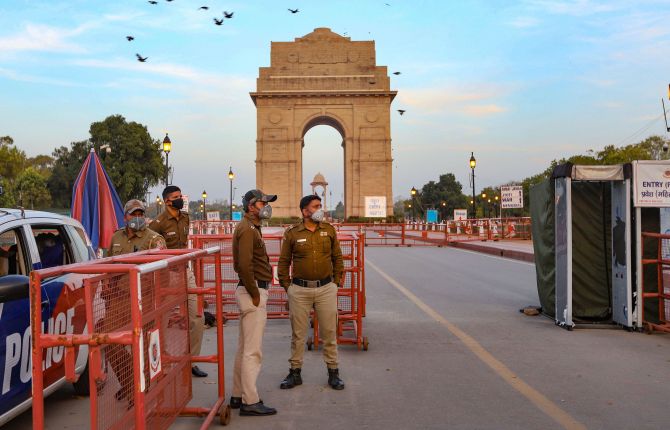Earthquake Tremors Felt in Delhi and Parts of North India
On Tuesday, June 13, 2023, a 5.4 magnitude earthquake hit Doda in Jammu and Kashmir, causing tremors across Delhi and other parts of north India. The quake occurred at a depth of 6 km and was felt at around 1:30 pm, according to the National Centre for Seismology (NCS).
Impact of the Earthquake
The earthquake caused panic among people in the affected areas, especially in Doda's Bhaderwah town, where some buildings developed cracks and the false ceiling of a hospital ward collapsed. Some patients were injured by the debris and had to be shifted to another ward. A resident of Ghata Bhaderwah said his house was also damaged by the quake.
In Delhi and other parts of north India, the tremors were mild but noticeable. People reported feeling their furniture and utensils shaking, and some schoolchildren gathered in open fields for safety. There were no reports of major casualties or damage to property in these regions.
What is an Earthquake?
An earthquake is a sudden shaking of the ground caused by the movement of tectonic plates along faults or fractures in the Earth's crust. The point where the earthquake originates is called the focus or hypocenter, and the point on the surface directly above it is called the epicenter. The magnitude of an earthquake is measured by the amount of energy released at the focus, using a logarithmic scale called the Richter scale. The intensity of an earthquake is measured by its effects on people, buildings and natural features, using a scale called the Modified Mercalli scale.
Why are Earthquakes Common in North India?
North India lies in a seismically active zone, where the Indian plate is colliding with the Eurasian plate. This collision creates stress and strain along the Himalayan arc, which is marked by several faults and fractures. These faults can rupture and slip during an earthquake, releasing energy and causing tremors. Some of the major earthquakes that have occurred in this region include the 1905 Kangra earthquake (magnitude 7.8), the 1934 Bihar-Nepal earthquake (magnitude 8.1), the 1950 Assam-Tibet earthquake (magnitude 8.6), the 1991 Uttarkashi earthquake (magnitude 6.8), the 1999 Chamoli earthquake (magnitude 6.8), the 2001 Bhuj earthquake (magnitude 7.7), the 2005 Kashmir earthquake (magnitude 7.6) and the 2015 Nepal earthquake (magnitude 7.8).
How to Prepare for an Earthquake?
Earthquakes are unpredictable and can strike anytime, anywhere. Therefore, it is important to be prepared for them and know how to react during and after them. Here are some tips to follow:
- Before an earthquake, identify safe places in your home and workplace, such as under sturdy tables or against interior walls. Avoid places near windows, mirrors, heavy furniture or objects that can fall.
- Prepare an emergency kit with essential items such as water, food, flashlight, radio, batteries, first-aid kit, medicines, cash and important documents. Keep it in a place where you can easily access it.
- Make a family emergency plan with contact numbers, meeting points and evacuation routes. Practice it regularly with your family members.
- During an earthquake, if you are indoors, drop to the ground and take cover under a sturdy table or against an interior wall. Hold on until the shaking stops. Stay away from windows, doors or objects that can fall or break.
- If you are outdoors, move away from buildings, trees, power lines or anything that can fall or collapse. Find an open area and stay there until the shaking stops.
- If you are in a vehicle, pull over to a safe place away from bridges, overpasses or buildings. Stay inside your vehicle until the shaking stops.
- After an earthquake, check yourself and others for injuries and provide first aid if needed. Use your phone only for emergency calls or messages.
- Be prepared for aftershocks, which are smaller earthquakes that follow the main one. They can cause further damage or injuries, so stay alert and follow the same safety measures as during the main quake.
- Listen to the radio or TV for updates and instructions from the authorities. Follow their advice on whether to stay put or evacuate.
- Avoid damaged areas, roads or bridges. Stay away from downed power lines, gas leaks or fires. Report any hazards or damages to the authorities.
Conclusion
Earthquakes are natural phenomena that can cause a lot of destruction and distress. However, by being aware, prepared and resilient, we can minimize their impact and recover from them. We should also support each other and help those in need during such times of crisis.
Source
(1) Earthquake tremors felt in Delhi, parts of north India. https://economictimes.indiatimes.com/news/india/earthquake-tremors-felt-in-delhi-parts-of-north-india/articleshow/100960413.cms.
(2) Earthquake Today: Earthquake Tremors Felt In Delhi, Parts Of North India. https://www.msn.com/en-in/news/other/earthquake-today-earthquake-tremors-felt-in-delhi-parts-of-north-india/ar-AA1ctC3N.
(3) 5.4-magnitude quake hits J-K's Doda; tremors felt in parts of north India. https://www.rediff.com/news/report/54-magnitude-quake-hits-j-ks-doda-tremors-felt-in-parts-of-north-india/20230613.htm.
(4) Earthquake tremors felt in Delhi and parts of north India. https://timesofindia.indiatimes.com/india/earthquake-tremors-felt-in-delhi-and-parts-of-north-india/articleshow/100960300.cms.








